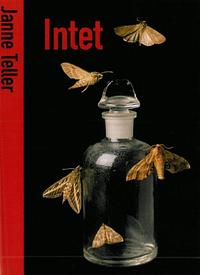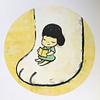Take a photo of a barcode or cover
I read this book in one day. I thought it was brilliantly written, even with the minor odd translation errors. I liked the honesty of it, because let's be brutally honest -- this book is 100% realistic. Though at times I thought the parents SHOULD know something was amiss, this could happen, whether anybody wants it to or not. The horror of this novel lies in how everything escalates into downright inhumanity, yes, but the disturbing part is how it's plausible. Anything can happen, and this book proved it.
*Edit 6 years later: This book is not realistic. The second to last sentence doesn't make sense.
-----
Heap of Meaning:
Dennis – Dungeons & Dragons books
Sebastian – fishing rod
Richard – black soccer ball
Laura – African parrot earrings
Agnes – green wedge sandals
Gerda – Oscarlittle (hamster)
Maiken – telescope
Frederik – Dannebrog, Danish flag
William – diary
Anna-Li – adoption certificate
Ingrid – new crutches
Henrik – snake in formaldehyde
Otto – boxing gloves
Elise – dead little brother in coffin
Ursula-Marie – long, blue, braided hair
Hussain – prayer mat
Hans – yellow bike
Sofie – her virginity
Karl – the Jesus on the Cross at the local church
Rosa – the head of Cinderella, the town dog
Jon-Johan – his index finger
It is described in the book when each must give something up to the heap and their reactions to it. Otto starts the deviousness when he tells Elise to dig up her baby brother. Hans, who is attached to his yellow bike, is really angry and as a result he chooses something huge to make Sofie give up – her innocence, which he takes one night with a few others watching. So I’m guessing he raped her, because it describes how Hans was bending over backward for Sofie the following day, which is a common occurrence when having sex for the first time, especially when young. There’s a deep emotional aspect that kids don’t know about. Karl, who is super religious, is upset he had to decimate the statue in the church, so he asks for the dog’s head. Rosa slits the throat and cuts the head off. Next, she makes Jon-Johan give up a finger because he is an avid guitar player. Sofie, who has become strange and indifferent since being raped, volunteers to ruthlessly cut off his finger, and that is thrown into the heap.
However, Jon-Johan tells on them. The cops show up to the sawmill and find the heap of meaning. The kids are reprimanded by their parents. Some show intense guilt, others not so much, but in general they stick together. Agnes calls up the local newspaper for them to do a story about the heap. They all pledge that they have finally found the meaning.
Unfortunately, Pierre Anthon doesn’t give a shit. He calls it their pile of junk, still meaningless.
The media is giving the children so much attention, and soon the heap of meaning becomes a sensation. Yet despite the craze, it annoys all of them that Pierre Anthon doesn’t care and will not budge. He said “the meaning is relative, and therefore meaningless.”
However, the heap of meaning becomes art, and some museum in USA buys it (of course they do). Pierre Anthon, after a few months, finally goes to see the heap of meaning before it is shipped off. He sees a rag and Sofie goes insane, screaming that that is the meaning (this was the rag that held, I’m guessing, semen and blood). They all brutally attack Pierre Anthon, the entire lot of them, and leave him dead in the sawmill, which burns to the ground later that night.
I read this piece of work ten years or so ago, and it’s still relatively haunting. It shows the lengths of which people will go to prove someone wrong, to find meaning in their lives, and what happens when you force someone to give up something that means something to them. For instance, Sofie’s virginity, and how it completely changed her from then on, or Jo-Johan’s finger, or Elise’s dead brother they graverobbed. It just went from 0 to 100 real quick. These kids turned into little monsters, and they were only thirteen-fourteen. Pierre Anthon had no right to sit up on his high horse and patronize everyone, but they had no right to take the steps they took to prove him wrong. Why not just . . . ignore him?
Because everyone needs to have meaning to their lives, to objects, to things they cherish and love. Who wants to be told that what they hold dear essentially means nothing?
*Edit 6 years later: This book is not realistic. The second to last sentence doesn't make sense.
-----
Spoiler
One day, a kid in their class named Pierre Anthon sits atop a plum tree and tells everyone that everything means nothing; there is no meaning to anything, and there never was, and never will be. He asserts that all lives are meaningless, and he bullies his classmates when they walk to and from school each day. So, naturally, they decide to come up with a plan to prove Pierre Anthon wrong – they decide that each of them has to give up something actually meaningful to them, and one by one, they resolve to do it. They’d stack the objects in a pile in an old abandoned sawmill. Each person chooses the meaningful item of the next, and that person HAS to give it up, regardless. It’s innocent at first, but eventually gets very dark.Heap of Meaning:
Dennis – Dungeons & Dragons books
Sebastian – fishing rod
Richard – black soccer ball
Laura – African parrot earrings
Agnes – green wedge sandals
Gerda – Oscarlittle (hamster)
Maiken – telescope
Frederik – Dannebrog, Danish flag
William – diary
Anna-Li – adoption certificate
Ingrid – new crutches
Henrik – snake in formaldehyde
Otto – boxing gloves
Elise – dead little brother in coffin
Ursula-Marie – long, blue, braided hair
Hussain – prayer mat
Hans – yellow bike
Sofie – her virginity
Karl – the Jesus on the Cross at the local church
Rosa – the head of Cinderella, the town dog
Jon-Johan – his index finger
It is described in the book when each must give something up to the heap and their reactions to it. Otto starts the deviousness when he tells Elise to dig up her baby brother. Hans, who is attached to his yellow bike, is really angry and as a result he chooses something huge to make Sofie give up – her innocence, which he takes one night with a few others watching. So I’m guessing he raped her, because it describes how Hans was bending over backward for Sofie the following day, which is a common occurrence when having sex for the first time, especially when young. There’s a deep emotional aspect that kids don’t know about. Karl, who is super religious, is upset he had to decimate the statue in the church, so he asks for the dog’s head. Rosa slits the throat and cuts the head off. Next, she makes Jon-Johan give up a finger because he is an avid guitar player. Sofie, who has become strange and indifferent since being raped, volunteers to ruthlessly cut off his finger, and that is thrown into the heap.
However, Jon-Johan tells on them. The cops show up to the sawmill and find the heap of meaning. The kids are reprimanded by their parents. Some show intense guilt, others not so much, but in general they stick together. Agnes calls up the local newspaper for them to do a story about the heap. They all pledge that they have finally found the meaning.
Unfortunately, Pierre Anthon doesn’t give a shit. He calls it their pile of junk, still meaningless.
The media is giving the children so much attention, and soon the heap of meaning becomes a sensation. Yet despite the craze, it annoys all of them that Pierre Anthon doesn’t care and will not budge. He said “the meaning is relative, and therefore meaningless.”
However, the heap of meaning becomes art, and some museum in USA buys it (of course they do). Pierre Anthon, after a few months, finally goes to see the heap of meaning before it is shipped off. He sees a rag and Sofie goes insane, screaming that that is the meaning (this was the rag that held, I’m guessing, semen and blood). They all brutally attack Pierre Anthon, the entire lot of them, and leave him dead in the sawmill, which burns to the ground later that night.
I read this piece of work ten years or so ago, and it’s still relatively haunting. It shows the lengths of which people will go to prove someone wrong, to find meaning in their lives, and what happens when you force someone to give up something that means something to them. For instance, Sofie’s virginity, and how it completely changed her from then on, or Jo-Johan’s finger, or Elise’s dead brother they graverobbed. It just went from 0 to 100 real quick. These kids turned into little monsters, and they were only thirteen-fourteen. Pierre Anthon had no right to sit up on his high horse and patronize everyone, but they had no right to take the steps they took to prove him wrong. Why not just . . . ignore him?
Because everyone needs to have meaning to their lives, to objects, to things they cherish and love. Who wants to be told that what they hold dear essentially means nothing?
dark
reflective
dark
tense
medium-paced
Plot or Character Driven:
Character
Strong character development:
Yes
Loveable characters:
No
Diverse cast of characters:
Yes
Flaws of characters a main focus:
Yes
Sem palavras...
"Choramos porque havíamos perdido algo e ganhado algo. E porque perder doía tanto quanto ganhar. E porque sabíamos o que havíamos perdido, mas ainda não conseguíamos pôr em palavras o que havíamos ganhado."
"Choramos porque havíamos perdido algo e ganhado algo. E porque perder doía tanto quanto ganhar. E porque sabíamos o que havíamos perdido, mas ainda não conseguíamos pôr em palavras o que havíamos ganhado."
En su momento, cuando me lo recomendaron, me dijeron que simplemente era una novela más para adolescentes. Realmente, no creo que pueda ser catalogada como "una novela más".
En el libro, hay varios mensajes y además, una de las cosas buenas es que te pueden dejar pensando sobre ellas (e incluso, hacer una visión retrospectiva al 2000 para ver si ha cambiado o no la situación). No obstante, lo hacen de una manera muy macabra.
Tal vez, este rechazo que siento por el libro es precisamente porque pensaba que iba a ser algo mucho más "light" y me he llevado la sorpresa de que no ha sido para nada "light".
Respecto a los personajes, no diría que son personajes planos (al menos, no en su totalidad, ya que se pueden distinguir algunos cambios), pero sí que no podemos ver una profundidad muy notoria en ellos, solo sabemos rasgos característicos respecto a la personalidad, atributos físicos, religión, tipo de familia... y poco más.
Realmente, es un libro que se lee rápido, te engancha y quieres saber qué es lo siguiente que va a ocurrir, el final; no diré que es predecible, pero sí que es algo que podrías llegar a imaginar una vez que ves cómo de macabro se vuelve el libro.
En el caso de preguntarme si recomiendo el libro, mi respuesta es un sí. Es un libro rápido, que no sencillo- que te mantiene en vilo. No obstante, no lo catalogaría como un gran libro.
En el libro, hay varios mensajes y además, una de las cosas buenas es que te pueden dejar pensando sobre ellas (e incluso, hacer una visión retrospectiva al 2000 para ver si ha cambiado o no la situación). No obstante, lo hacen de una manera muy macabra.
Tal vez, este rechazo que siento por el libro es precisamente porque pensaba que iba a ser algo mucho más "light" y me he llevado la sorpresa de que no ha sido para nada "light".
Respecto a los personajes, no diría que son personajes planos (al menos, no en su totalidad, ya que se pueden distinguir algunos cambios), pero sí que no podemos ver una profundidad muy notoria en ellos, solo sabemos rasgos característicos respecto a la personalidad, atributos físicos, religión, tipo de familia... y poco más.
Realmente, es un libro que se lee rápido, te engancha y quieres saber qué es lo siguiente que va a ocurrir, el final; no diré que es predecible, pero sí que es algo que podrías llegar a imaginar una vez que ves cómo de macabro se vuelve el libro.
En el caso de preguntarme si recomiendo el libro, mi respuesta es un sí. Es un libro rápido, que no sencillo- que te mantiene en vilo. No obstante, no lo catalogaría como un gran libro.
Initial feelings (1 star). I might rate it higher after more reflection.
Okay, fineee. I reflected. The theoretical implications in this book are pretty wild and cool, so I do like it more because of its approach. I'm placing it in a category of "Really liked it because of it was fun to analyze," and as bleak as its "meaning" is - HA, it's probably the boldest YA book I've ever read. Though, I should add - the narrative/writing itself wasn't really special and this didn't blow my mind in terms of characterization or even setting or language... so it's a weird spot. It's more one of those allegory books. Really I'm giving it 4 stars because its showcases how life has no rhyme or reason and is only chaos. I'm in grad school right now so this is quite fitting.
Okay, fineee. I reflected. The theoretical implications in this book are pretty wild and cool, so I do like it more because of its approach. I'm placing it in a category of "Really liked it because of it was fun to analyze," and as bleak as its "meaning" is - HA, it's probably the boldest YA book I've ever read. Though, I should add - the narrative/writing itself wasn't really special and this didn't blow my mind in terms of characterization or even setting or language... so it's a weird spot. It's more one of those allegory books. Really I'm giving it 4 stars because its showcases how life has no rhyme or reason and is only chaos. I'm in grad school right now so this is quite fitting.
slow-paced
Plot or Character Driven:
Character
Strong character development:
No
Loveable characters:
No
Diverse cast of characters:
No
Flaws of characters a main focus:
Complicated
Not quite sure what I just read, but it felt like "nothing" happened.
dark
emotional
fast-paced
Plot or Character Driven:
Character
Loveable characters:
No
dark
reflective
fast-paced
Plot or Character Driven:
A mix
Strong character development:
Complicated
Loveable characters:
No
Diverse cast of characters:
Yes
Flaws of characters a main focus:
Complicated
Wow. Just, wow. I was thinking it was going to happen, but I was hoping it wasn't. A must-read.







